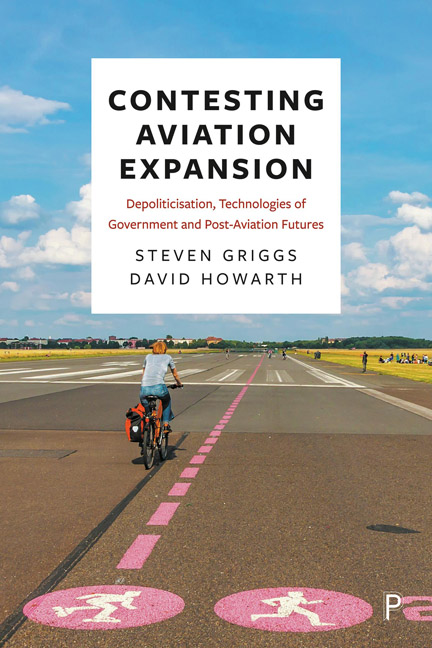 Contesting Aviation Expansion
Contesting Aviation Expansion Book contents
- Frontmatter
- Contents
- List of figures and tables
- List of abbreviations
- Acknowledgements
- Introduction: Problematising the dilemmas of UK airport expansion – puzzles and research strategies
- 1 Depoliticisation, discourse and policy hegemony
- 2 Governing by numbers: fantasies of forecasting, ‘predict and provide’ and the technologies of government
- 3 The anatomy of an expert Commission: Howard Davies, rhetorical reframing and the performance of leadership
- 4 Repoliticising aviation policy: law, planning and persistent activism
- 5 Extreme turbulence: problematisations, multiple crises and new demands
- 6 ‘What if…?’ A manifesto for the green transformation of aviation
- Conclusion: Staying grounded
- Notes
- References
- Index
2 - Governing by numbers: fantasies of forecasting, ‘predict and provide’ and the technologies of government
Published online by Cambridge University Press: 18 January 2024
- Frontmatter
- Contents
- List of figures and tables
- List of abbreviations
- Acknowledgements
- Introduction: Problematising the dilemmas of UK airport expansion – puzzles and research strategies
- 1 Depoliticisation, discourse and policy hegemony
- 2 Governing by numbers: fantasies of forecasting, ‘predict and provide’ and the technologies of government
- 3 The anatomy of an expert Commission: Howard Davies, rhetorical reframing and the performance of leadership
- 4 Repoliticising aviation policy: law, planning and persistent activism
- 5 Extreme turbulence: problematisations, multiple crises and new demands
- 6 ‘What if…?’ A manifesto for the green transformation of aviation
- Conclusion: Staying grounded
- Notes
- References
- Index
Summary
In the final years of the Second World War, the UK aviation industry was singled out in the corridors of power as a strategic driver of post-war recovery (Barnett, 1995; Engel, 2007; Edgerton, 2018: 189–90). This state sponsorship rapidly coalesced around a regime of aviation expansion which was predicated on a predominant social logic of ‘predict and provide’ (Adams, 1981; Dudley and Richardson, 1998). ‘Predict and provide’ was inscribed in the apparatus of the state and government, spelling out an administrative rationality that informed the energies of ministerial staff in planning and delivering additional airport capacity, where the latter was deemed necessary to meet the predicted exponential growth of passenger numbers. Hence, aviation policy was strategically pared down to the interdependent and ‘troublesome’ tasks of determining the timing of new airport infrastructure, deciding on or making a case for particular sites or locations and ushering proposed developments through planning processes and any local opposition. In other words, decisions over the need for, and the siting of, additional runways and terminals, came to rest on the predictive capabilities of the practices of forecasting and quantification of future passenger demand.
This chapter explores how the knowledge and expertise of forecasting brought into play complex political processes of data accumulation, calculation and modelling in the realm of aviation and airport expansion. We show how the DfT, in its various guises, constituted a wealth of categories, assumptions, economic models and statistical techniques, which sought to normalise expectations of expansion, putting in place complex assemblages of alternative projections of air travel across the UK and individual airports. Paradoxically, practices of forecasting provided a framework and a stage for core decision-making in the present, while effectively projecting the making and implementation of concrete decisions into a depoliticised space of the future. Along this pathway, the magical currency of numbers and the logics of quantification enabled the DfT to position itself as a ‘centre of power’, which could marginalise all but the most expert and powerful of citizens and groups.
However, despite assembling these statistical and modelling tools, we argue that in the field of airport and aviation expansion provision did not always follow prediction.
- Type
- Chapter
- Information
- Contesting Aviation ExpansionDepoliticisation, Technologies of Government and Post-Aviation Futures, pp. 43 - 72Publisher: Bristol University PressPrint publication year: 2023


